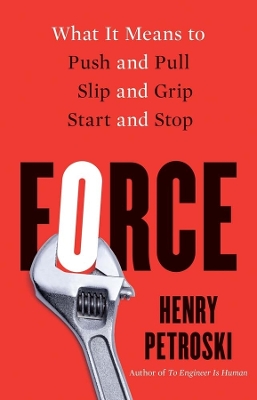
An eminent engineer and historian tackles one of the most elemental aspects of life: how we experience and utilize physical force
“Another gem from a master of technology writing.”—Kirkus Reviews
Force explores how humans interact with the material world in the course of their everyday activities. This book for the general reader also considers the significance of force in shaping societies and cultures.
Celebrated author Henry Petroski delves into the ongoing physical interaction between people and things that enables them to stay put or causes them to move. He explores the range of daily human experience whereby we feel the sensations of push and pull, resistance and assistance. The book is also about metaphorical force, which manifests itself as pressure and relief, achievement and defeat.
Petroski draws from a variety of disciplines to make the case that force—represented especially by our sense of touch—is a unifying principle that pervades our lives. In the wake of a prolonged global pandemic that increasingly cautioned us about contact with the physical world, Petroski offers a new perspective on the importance of the sensation and power of touch.
Solid Exposition Of Applied Physics. This book truly is one of the better written, more approachable books on applied physics for the "layman" that I've come across. It takes most every easily observed physical force, from a simple push to gravitational to magnetic to torque and beyond, and explains the basics of the known history and science behind them all, and it does this in a very conversational and even, at times, humorous tone. Truly, a great book on the subject for those who either don't know much or simply want an easy and lighthearted look and things they mostly already know.
The two star deductions are more of a standard form for me, and don't actually speak to the overall nature of this book *too* harshly: The first is because of the COVID discussions in both the early and late parts of the text. *I DO NOT WANT TO READ ABOUT COVID. PERIOD.* And I am waging a one-man war against the topic everywhere I encounter it in booklandia. The single star deduction is really the only weapon I have in this war, so it is used where applicable. The other deduction is the short-ish bibliography, clocking in at just 14% of the text here when 20-30% is more normal of such texts in my experiences.
Ultimately this really was a great and engaging look at its topic, and it is very much recommended.
Reading updates
-
Started reading
-
Finished reading
-
11 September, 2022:
Reviewed
